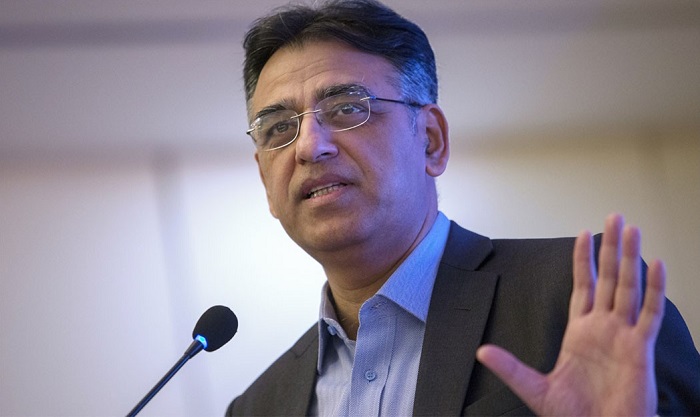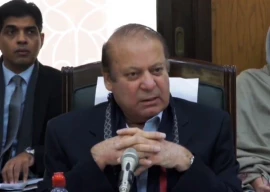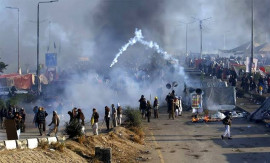
Umar questions UK move to ban Pakistani travellers
Mosques to remain open for Taraweeh in Ramazan
Federal Minister Asad Umar, who is also heading the National Command and Operation Centre (NCOC), on Saturday questioned the British government’s decision to add Pakistan to its 'red list' of travel restrictions due to a surge in Covid-19 cases.
Separately, the religious affairs and interfaith harmony ministry has said mosques would remain open across the country for congressional Taraweeh prayers during the holy month of Ramazan.
Umar, the head of the nerve centre for the country's combined response to the virus outbreak, tweeted that the move to add Pakistan to the red list raised a legitimate question whether the choice of countries was based on science or foreign policy.
A day earlier, the British government announced that Pakistan had been added to the country's 'red list' of travel restrictions due to a rise in coronavirus cases.
The minister also shared a letter written by a member of the British Parliament for Bradford West, Naz Shah, which also questioned the ban. The British MP asked whether the decision was led by any scientific data.
“According to recently available data for the last seven days, France, Germany and India have a substantially higher number of infection per 100,000,” MP Shah noted.
The figures quoted by Shah are as follows: Pakistan: 13, UK: 54, Bangladesh: 15, Germany: 137, Kenya: 17, India: 24 and France: 403, "It must also be noted that as of today, the South African variant isn't a concern in Pakistan whereas this isn't the case for example in France and other countries. This begs the question why hasn't the government extended the red list to France, Germany, and India?” she asked.
“The government doesn't have a coherent strategy in dealing with the red list,” the MP added.
“The government isn’t serious about protecting the British public as its applying decisions led by politics, not data.”
Shah further said that contrary to what the UK government was saying, it is clearly not making decisions led by science or data.
"Further, it was knowingly and consciously discriminating against Pakistan and the Pakistani diaspora community," the British MP added.
Separately, the religious affairs ministry in a statement issued on Saturday evening said that the decision to keep mosques open was taken during a NCOC meeting.
Read more: UK bans entry of travellers from Pakistan, three other countries over pandemic fear
Like last year, the statement added, mosques would remain open and prayers would take place. However, they would be allowed subject to the 20-point agreement between the stakeholders.
As per the pact, no carpets or dariyaan (mats) would be laid down in mosques because the virus was airborne. "Clean floors for prayers must be ensured. If people want to bring prayer mats from home they may do so," the statement added.
It read that no gatherings after Namaz and Taraweeh would be permitted, adding that if a mosque had an open area or garden, then it was preferable to conduct prayers there.
According to the ministry, people over 50 years of age and children should not be allowed in mosques and everyone must follow the instructions of social distancing by the World Health Organisation (WHO) and other health experts.
"Taraweeh should not be held on roads, footpaths and anywhere else than the mosque premises. People should continue to keep offering regular prayers at home."
The statement read that the floors of mosques should be washed with chlorinated water regularly, adding that there should be a six-foot distance during congregational prayers.
"The mosque should form committees to ensure that people are abiding by the rules and decided SOPs," the 20-point agreement stated.
It said that markers should be made on the floors of mosques and Imambargahs to guide people about the distance they should keep from others.
People should do ablution at home, must wear face masks when coming to mosques and maintain physical distance and avoid handshakes.
The statement also said that Itikaf must be observed at home and no one should prepare or hold Sehri and Iftaar in mosques. "Mosque committees should be in constant contact with the provincial government," the statement said that added that the committees are allowed to conduct Taraweeh under these SOPs.
The statement further said that the decision can be reviewed if, during Ramazan, the government felt that the situation had gotten out of control or a surge in the number of cases was witnessed.
Pakistan on Saturday recorded 4,723 new Covid-19 cases and 84 fatalities over the previous 24-hour period. India, on the other hand, recorded 81,466 new infections during the same time period, with the chief minister of India’s Maharashtra state warning of a full lockdown to curb coronavirus infections if people did not limit their movement, as the country hit a six-month high for daily cases.





















COMMENTS
Comments are moderated and generally will be posted if they are on-topic and not abusive.
For more information, please see our Comments FAQ